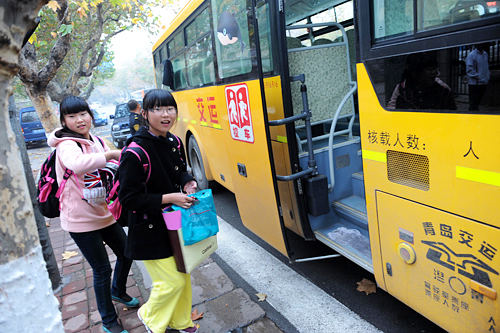|
 |
|
SAFE SERVICE: Students of the Experimental Primary School in Qingdao, Shandong Province, get aboard a school bus that complies with international safety standards, on November 18 (LI ZIHENG) |
Little Doctor Kindergarten, whose children were involved in the November 16 accident attended, was the only kindergarten in Yulinzi Town. Farmers in the area mainly make a living by selling cured tobacco and are poor. Most parents cannot afford private cars and usually travel by bicycles, so they let their children commute by buses operated by the kindergarten.
The kindergarten had 737 children and four school buses. To reduce costs, rather than letting the buses make multiple trips, the school filled the vehicles far beyond their capacity, each usually carried 60 children.
A number of factors are to blame for the high frequency of school bus accidents, said Jiang Zhuangde, Vice President of Xi'an Jiaotong University. These factors include substandard school buses, unqualified drivers and the overloading of passengers.
At the Fourth Session of the 11th National People's Congress, China's top legislature, held in March, Jiang suggested that standard school buses should be produced and used, and fiscal support should be given to qualified manufacturers.
At the same meeting, Tang Yuxiang, President of Yutong Group, a leading bus manufacturer in China, also submitted a motion to promote the use of standard school buses.
Tang said that since many schools do not have school buses, parents use private cars to take students to school, which causes traffic jams and air pollution.
Beijing, for example, has more than 1.2 million middle and primary school students, 70 percent of whom need parents to chauffeur them to and from school. As a result, tens of thousands of private cars jam roads during school-rush hours.
In July 2010, a national safety standard on school buses came into effect in China.
The standard specifies, in detail, mandatory safety features on buses used for transporting school children, including fireproof materials and firefighting equipment, seat belts, windows, emergency exits, the "black box" and seats reserved for caretakers.
"Standard school buses are very different from regular buses," said Li Tao, Director of the Collision Laboratory of the National Coach Quality Supervision and Testing Center and a drafter of the safety standard for school buses. "Regular buses are designed for adults, while school buses need additional features to protect children," he said.
"However, the standard has been poorly implemented because of inadequate funding, especially in private schools," said Xia Xueluan, a sociology professor at Peking University.
A special school bus usually costs 100,000 yuan ($15,729) to 200,000 yuan ($31,458) more than a regular bus, Li said. The extra money is mainly spent on safety devices.
But Li believes the purchase price is not the primary obstacle for promoting school buses.
"School buses are different from vehicles for tourist purposes, which need a variety of costly entertainment devices and associated accessories. In fact, when we formulated the standard, we talked to many bus manufacturers and schools about the cost. Generally speaking, schools can afford to buy such buses. That is not a problem," Li said.
But the operating costs of school buses is very high as buses stand idle for a large part of the day and during holidays, so it is impossible to make a profit from them, which is the major reason that schools are reluctant to buy such buses, Li said.
Experts say that school buses are quasi-public goods and should be subsidized by the government.
At a meeting on August 24, the Ministry of Education decided to pilot special school buses for primary and middle school students in six counties and cities across the country.
The school bus program in Deqing, Zhejiang Province, is widely regarded as a success. In 2009, the local government invested 20 million yuan ($31.46 million) to purchase 79 school buses, including 14 U.S.-style "long-nosed" vehicles, and set up a company to operate the service.
The buses transport about 5,600 primary students, or half of the total in the county, to and from school. Every student pays 1 yuan ($0.16) for a trip, and officially recognized poor students ride for free. So far, the school buses have been running for two years without any accident.
The annual operation cost of the school buses is about 5 million yuan ($786,600), more than half the cost is paid by the government, said Zhang Fan, an official with Deqing County's Bureau of Education. The county government has spent 0.8 percent of its education budget subsidizing the buses.
School bus programs not only exist in such affluent counties as Deqing. Kuandian in Liaoning, though far from wealthy, also launched a school bus program in 2008 to chauffeur about 4,000 boarding students to and from school at weekends.
The county purchased 12 school buses at a cost of 2.4 million yuan ($377,620), and it spends 2 million yuan ($314,600) on subsidies each year.
After the tragic crash on November 16, Qingyang also decided to equip its kindergartens with standard school buses. On November 18, the local government announced that it would abort government car purchase programs in 2012, and use the money to purchase standard school buses for kindergartens instead. | 